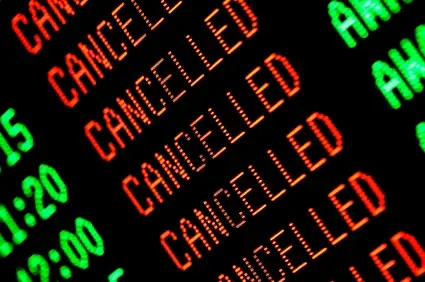
The Department of Transportation (DOT) announced it will hand out a combined $175,000 in fines following this past August’s overnight tarmac delay fiasco in Rochester, Minnesota. Just to refresh your memory, 47 passengers were held on the tarmac overnight aboard a Continental flight (operated by ExpressJet), thanks to an almost-comical series of errors and miscommunications.
Continental and ExpressJet will apparently share a $100,000 portion of the fine (it’s not yet clear how that will be worked out), while Mesaba Airlines will be responsible for the remaining $75,000. Mesaba, you may recall, was the only staffed airline on the ground when Continental Flight 2816 landed, and was blamed for most of the miscommunications.
“I hope that this sends a signal to the rest of the airline industry that we expect airlines to respect the rights of air travelers,” U.S. Transportation Secretary Ray LaHood said in a statement. “We will also use what we have learned from this investigation to strengthen protections for airline passengers subjected to long tarmac delays.”
The fines are the latest in a series of severe penalties handed out by the DOT in response to consumer rights issues. This past September, the DOT slammed Spirit with hundreds of thousands of dollars in fines for various violations, and followed up that fine with a stern warning to the rest of the industry. The department’s strong initial reaction to the Rochester debacle was also seen as a shift in tone.
But the DOT isn’t the only guard on duty. The European Court of Justice just ruled that customers who arrive three hours late should be entitled to the same compensation as passengers whose flights are cancelled, which means flat-rate refunds of up to €600 (roughly $900, see XE.com for current exchange rates). Exceptions can be made only in extreme cases, which notably do not include mechanical issues. “There is no justification for treating passengers whose flight is delayed any differently when they reach their final destination three hours or more after the scheduled arrival time.”
But are fines and refunds really the solution? Or, in some cases, even fair? The E.U.’s judgment, in particular, is almost begging to be argued against. There’s “no justification” for treating passengers who arrive late any differently than passengers who don’t arrive at all? How about the fact that they did arrive? And is it fair to penalize airlines for unforeseeable mechanical problems?
And as for the DOT, heavy fines send a strong message to consumers, but even at $100,000 or more, they barely dent an airline’s bottom line. They’re a nuisance, at most. And is the DOT going to chase airlines around, investigating every single delay and handing out appropriate fines for each indiscretion? Seems like an awfully expensive wild goose chase to me. Can this approach actually affect any real change?
If anything, these two penalties reinforce the need for a new air traffic system here in the U.S., and a new, appropriate set of consumer rights and standards worldwide. Having the DOT police the airlines simply isn’t a sustainable way to improve the industry, and neither is forcing carriers to hand out hundreds of dollars to planes full of delayed passengers.
Don’t get me wrong: I have very little sympathy for the airlines, and I’m glad to see the governing bodies in the U.S. and abroad adopting a more aggressive approach to passenger rights issues. I’m also glad the industry is getting hit with financial penalties, and these should be included going forward. But we need a better system, one that prevents these delays from happening in the first place. After all, it’s nice to get some money back, or to see the villainous airline pay up, but who among us wouldn’t rather skip the whole ordeal in the first place?
We hand-pick everything we recommend and select items through testing and reviews. Some products are sent to us free of charge with no incentive to offer a favorable review. We offer our unbiased opinions and do not accept compensation to review products. All items are in stock and prices are accurate at the time of publication. If you buy something through our links, we may earn a commission.
Related
Top Fares From
Today's Top Travel Deals
Brought to you by ShermansTravel
Shop and Save with Country Inns...
Patricia Magaña
 Hotel & Lodging Deals
Hotel & Lodging Deals
$229 -- Chicago: Discounted Rates and...
Francesca Miele
 Hotel & Lodging Deals
$229+
Hotel & Lodging Deals
$229+
$188 -- Honolulu: Save on Oceanview...
Abigail Lamay
 Hotel & Lodging Deals
$188+
Hotel & Lodging Deals
$188+



